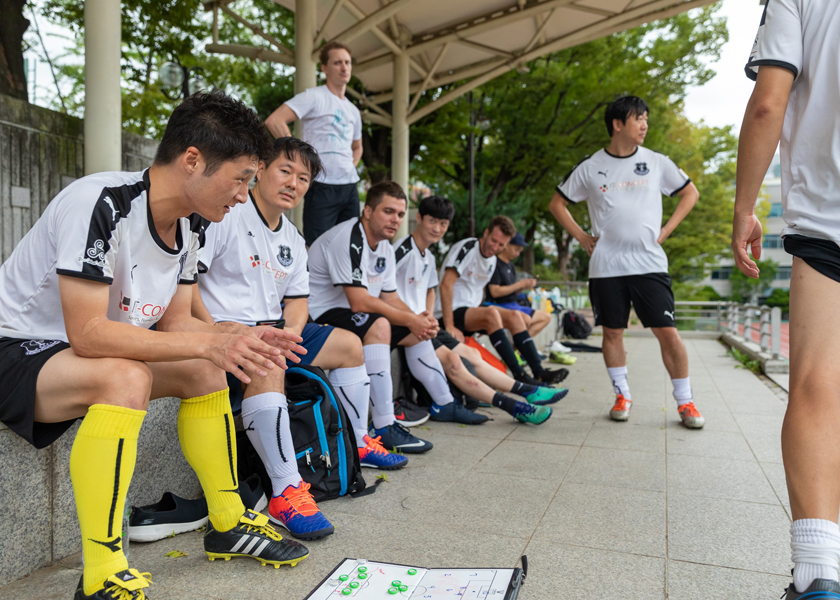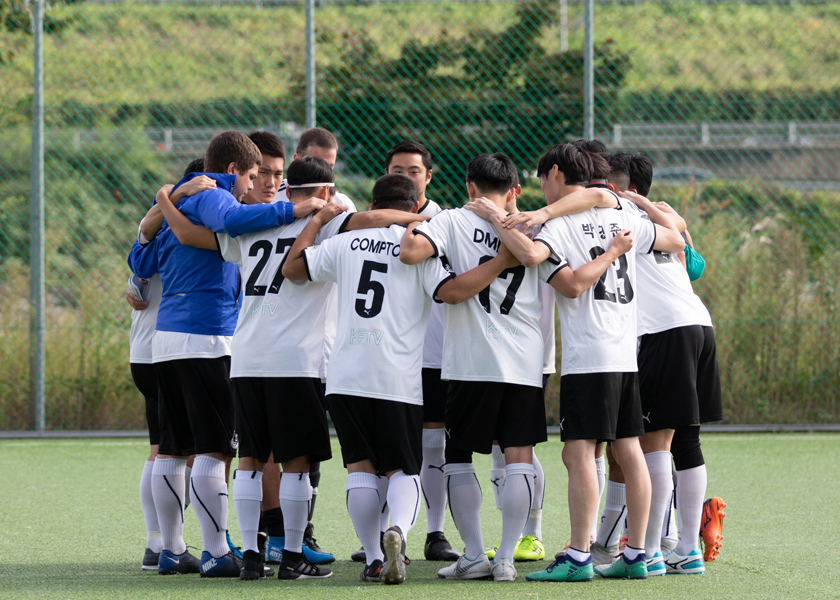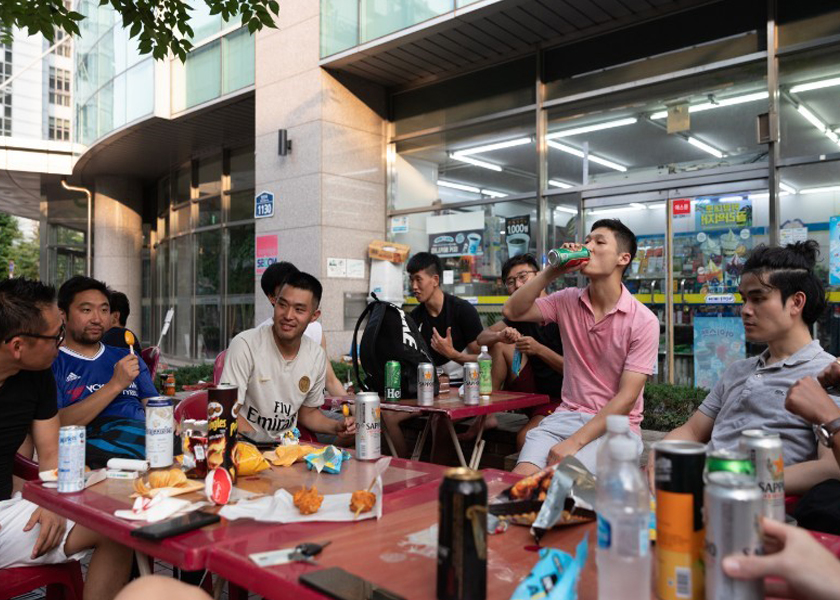Adoptees, Koreans, and the clash of cultures through soccer | By Tom McCarthy (Fall 2021 issue)

In the middle of monsoon season in 2020, a deluge of rain spoiled any desire to leave my apartment on a Sunday afternoon. With nothing else to do, I turned to a familiar comfort from my childhood, the long-running political drama series The West Wing.
I watched this idealistic portrayal of civilized politics with fluctuating interest until the character Toby Ziegler took center stage. With increasing indignation, he expressed frustration with other nations, for whom America’s actions would never be enough in this age of expansive globalization. If they won’t like us for our best efforts, he proclaimed emphatically, “They’ll like us when we win!”
I had heard that sentiment before, in a foreign but strangely similar context. On a crisp winter day earlier that year, our adoptee-based soccer team, the Korean Adoptees and Friends Football Club (KAFFC) found ourselves playing against a familiar adversary; an amalgamation of Koreans of all ages and backgrounds.
Over the preceding two years, we had developed a reputation of sorts: Aggressive, physical, rude, and disorganized. Aggressive? We want to win. Physical? Not by European standards. Rude? Our collective Korean-speaking ability is eclipsed by toddlers. Disorganized? That one’s undeniable.
During the break between the third of four 25-minute quarters (the standard match format for amateur football in Korea), we had committed at least 10 bookable fouls. Our team “instigator” managed to start four arguments. We were up by one goal, but the complaints from the other team were rising in volume and frequency.
“We play our game,” our co-captain said nonchalantly. “If we win, they can’t say anything.” The resemblance between his comments and Toby’s extended beyond the hubris; it was the underlying sentiment that we had exhausted our options, not just on the pitch but off it as well. In hilariously typical fashion, we collapsed in the last quarter and order was restored, but the on-field agitations lingered long after the post-match beers, even if we refused to acknowledge them.
Participating in recreational team sports in Korea affords adoptees a unique exposure to opinions we would never otherwise hear, at least not so directly outside the microcosm of a soccer game. In the heat of the moment, when pride (and safety) is at stake, the Korean players’ reactions are raw and unfiltered. We have interactions with millennials who make a commendable attempt to show support for a global community in Korea, middle-aged men who oscillate between pity and disgust for us, recent college graduates who want to know why the hell we came back, and high school hot-shots who make jokes about “boys without parents” (enjoy basic training, big guy). Even when the intentions are genuinely kind, the demarcation between “us” and “them” is as clear as the DMZ.
On our team, there are seven adoptees married to or living with Korean partners, some entrepreneurs who have employed young Korean nationals, and a host of professionals who interact with “Korean-Koreans” on a daily basis. None of that seems to matter when it comes down to it. We are “others;” not fully foreigners, but certainly not Koreans. What do you do when you can’t be what you want to be, but are denied as being what you are?
On my first weekend in Korea, I went to the weekly adoptee futsal (5-on-5 games) meetup. Having not played for years (and never having been very good to begin with), I had a horrendous hour that elicited sympathetic “good effort!” kind of remarks from the Dutch, French, Belgian, Danish, German, and Swedish guys. At half-time, as we were walking off the field, a star player from Norway turned to me. “Maybe you…” he said, gesturing toward the retirees playing on the next field, “should play over there.”
I didn’t go back to football for four years.

Fast forward to 2017, I finally built up the courage to return for a tournament hosted by Eastern Social Welfare Society. My performance was about as catastrophic as you could expect, but it was a no-brainer to return for futsal the next week, despite the Korean B-list celebrity team laughing at my many errors.
What was the difference? Being rejected by an adoptee (with what I came to recognize as standard football team banter, while eventually becoming very close friends with the offending Norwegian) felt different from the ridicule of the Koreans. I knew they were two separate things, but I couldn’t explain it at the time.
It was months later that I understood, after a comment by our perpetual Golden Boot winner who spent as much time scoring as he did on the ground looking for a foul. After a dismal quarter, he said, “They come to play football but they cannot accept the real game.” There it was: Combative defensiveness. They set us apart, so we dig in our heels and push back as a unit.
We are Caesar’s army outside Alesia, laying siege to their city. We don’t belong here, but we want to claim this land as our home. We can’t retreat; we’re trapped, not by Gallic reinforcements but by our own internal reasons. In our minds, this land is rightfully ours, and we have to prove that we belong. As with many armies throughout history, there can be explosive infighting. But when it matters, we make peace, rally, and return to the front together with a sense of unity.

After months as a team, it became ever more apparent that the entrenchment wasn’t one-sided. Between our failure to adhere to Korean football customs and torrential vulgarity in at least six languages (almost always directed at ourselves or our teammates), we weren’t exactly making it easy for the opposing team to get along with us. The effects of that same expansive globalization Toby lamented over sent us to frozen tundras, champagne vineyards, scenic fjords, and canal-lined towns; places where we would always, on an obvious level, be outsiders, despite the flawless local accents and a perfect grasp of cultural nuance.
Decades later, that same globalization would bring us back, many for postmodern reasons incomprehensible to Korea a couple of generations ago, when the only reasons to visit the peninsula were work-related. Now, in the age of direct flights, F-4 visas, and the Korean wave, we returned en masse, an amorphous demographic whose reasons for returning have often seemed unclear, even to many of us. And we were certainly unprepared.
With such easy access to Korea, the reverse-diaspora has sought to regain what was lost. It was harder than many of us anticipated as we arrived without doing our homework. The reintegration experience of adoptees is like a train heading toward the middle of nowhere; get off while you can, before you reach the last stop, where it’s just you and others like you. For us, it’s “KAFFC Station.” At each “stop” along the way, a new rebuff prevents us from disembarking, some further proof that there we are not totally like the people we see out the windows.
Plenty of motivated adoptees manage to disembark before it’s too late; learning near-fluent Korean, earning positions in big corporations, putting in enough effort — the right effort — to be welcomed into the fold, if not accepted entirely. For me and many others, we never speak Korean well enough for someone who looks Korean. We don’t demonstrate proper social etiquette. We don’t show enough deference to senior acquaintances. Despite genuine effort, we fall short.
So starts the “adoptee counter-culture.” If we can’t join your team, you will play ours. If you don’t like us when we try, maybe you’ll like us when we win — when we have something to show for ourselves. Suddenly, the dynamic shifts. What Korean doesn’t want to befriend the only ethnic Korean whose family owns a champagne house? Or talk football with someone who was on a UEFA Cup roster? Or hang out with a renowned DJ who has connections in all of the elite clubs of Seoul?
Whoever thought that would work was as delusional as those of us who showed up and thought they could become K-drama stars. An oddity with value is just a novelty. We’re the familiar-looking “friend” with a unique story, an attractive accent, a key that unlocks western dreams. We are still “others,” just with interesting conversation topics. But for our guys, that’s merely a part of life here.
There was a time for each of us when we resisted the ignominy of being the evening’s jester. As time passes, though, we find ourselves leaning into our novelty. If they’re hung up on our exoticness, we break out our greatest hits. There’s a certain amusement to be found in their expressions as we talk about our American muscle cars, our French vineyards, and our Scandinavian holidays under the Northern Lights. About growing up on unparalleled Belgian beer that costs the same as Cass, driving BMWs around the Nürburgring for birthdays, and going to watch some of the most legendary footballers in history play every weekend in the cathedrals of the sport around Europe.
We use our “otherness” to excuse our cultural faux pas without feeling too guilty for not knowing better. We certainly make an effort to build meaningful relationships with “Korean-Koreans” when we can, but we no longer stress about it when we can’t. Of course, we try to assimilate, but we aren’t delusional about it; we know we won’t be “adopted back.” Our attempts to integrate are more practical; “don’t rock the boat.” Get through the week so we can get to the football pitch. For 166 hours a week, we play a rigged game with rules we don’t fully understand. For two hours on the weekend, we play one where the rules are the same for all, where our feelings of “otherness” evaporate.
Ironically, it is during these two hours each weekend that we best understand “them.” Overworked, underpaid, and under pressure we could never imagine, soccer is their escape. Every weekend, rain or shine, they come out with their new boots, ready to try the latest moves they saw on YouTube. To them, our escape is different; it’s a navy or maroon booklet that can jettison us to a land far away from here.
On match day, we arrive late, we talk too loudly, and we don’t play nicely. Why wouldn’t they be irritated? Nonetheless, they come every week, just like us. It is then that the understanding begins: they need this as much as we do.
The truth of it is that the Korean teams’ weekly complaints are usually fairly justifiable, at least from their perspective.
“Why do you push like that?”
“We all have to go to work on Monday…”
“We don’t tackle like that here.”
Still, while this two-hour window brings our team closest to understanding what it means to be Korean, to think like a Korean, the complaints are reminders that our squad of imposter Koreans is not the same as them. Their grievances derive from a cultural canyon dividing who we could have been and who we are; how we play football, what we think about after the match. For some adoptees, in an ideal world, we would be the same as our opponents.
For me and the team, we’re fine with (and sometimes absolutely ecstatic about) the differences. But ultimately, there is an undeniable chasm, from language to hairstyle to demeanor. You can’t ignore the elephant in the room when he hacks at your ankles for two hours and swears in French.
During one match with a team of friendly (and extremely athletic) early-20-somethings, the player I was man-marking began asking me about my experience in Korea. Why did I come back? What did I like about it? What was my plan for the future? At the risk of depleting the atmosphere of oxygen, I kept my answers short, but his questions reverberated in my head.
As I ruminated on his questions, I came to the realization that no amount of ignorance, apprehension, or animosity could negate the incredible experiences I’ve had in Korea. Ups and downs happen anywhere, but I get to experience them here in Korea, with this group of idiots.

Looking around at the disaster of a team we had assembled as we sat at a convenience store for post-match beers (and ridicule), I realized that at the end of the day, I don’t need to be one of “them.” I’m one of “us,” and that counts for something; whatever we can make of it together, whatever we can win. We’ve got nowhere to run, nowhere to go. This is right where we belong.
In the end, we continue to play on, and they continue to play us. On and on it goes, week after week, month after month, year after year. Maybe they will never like us, no matter how much we win.
And maybe that’s okay.
We show up every weekend, and we’re here to stay.


